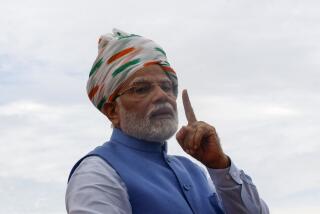Editor Provides an Outlet for Rural Gripes
- Share via
ALWAR, India — “We simply cannot imagine India without its villages,” newspaper editor Anil Kaushik says. These days, though, some of the old stereotypes need to be revised.
For instance, the mailbag of the 42-year-old boss of Alwar’s Vichar Times contains letters, words of protest, bittersweet poems and sarcastic and barbed essays from rural readers.
“Why has the bread for the poor become so expensive?” a man from one village, Kijara, lamented in a rhyming ditty published last month.
“They are left with just the skin on their bones,” the unhappy reader, Prabhudayal Premi, continued. “But still, why is everyone eating the flesh of the poor?”
Kaushik, whose wife, Anjana Anil, 39, serves as his managing editor and owner of record, sees signs of hope in such letters.
In his corner of the Indian state of Rajasthan, the rural populace, which once could be taken for granted by politicians and government functionaries as ignorant and submissive, is finding its voice--and using it.
“It’s clear: People are growing more vigilant about their rights,” Kaushik says.
Unlike many of the villagers themselves, the newspaperman credits the Indian government’s economic reforms.
“Now, the consumer is king. And that will go down to the villages, though it may take time,” predicts Kaushik, an immigrant from the neighboring northern state of Uttar Pradesh.
The fate of the Vichar Times, a four-page daily, buttresses Kaushik’s bubbling optimism. The Hindi-language publication, launched in 1990, has quadrupled its circulation, from 4,000 to 16,000.
Fully 70% of the copies, sold for less than 3 cents an issue, go to villages.
“It used to be we only sold two to three copies per village,” Kaushik explains. “Now, every sarpanch [village leader], shop, school, tea shop, bus counter and small panwallah [betel leaf and cigarette vendor] gets the newspaper.”
The rural locales of Alwar district, which used to be ruled by a local prince before Indian independence, are still light years from the global information superhighway.
But nonetheless, an information revolution of sorts is taking place.
“In the village, people watch Star TV [a Hong Kong-based satellite channel],” Kaushik says. “Things that were a universe away five years ago are now in our villages.”
More to Read
Sign up for Essential California
The most important California stories and recommendations in your inbox every morning.
You may occasionally receive promotional content from the Los Angeles Times.













